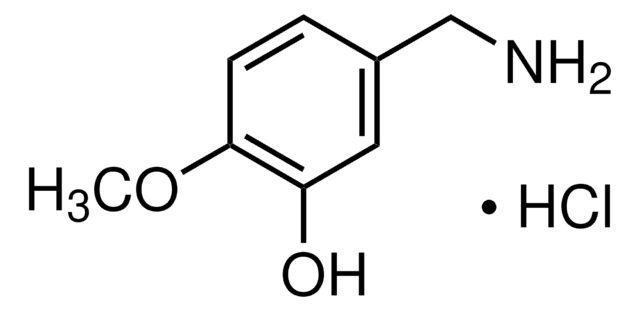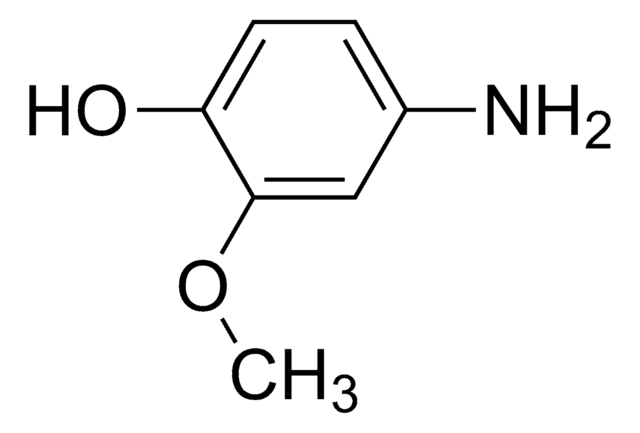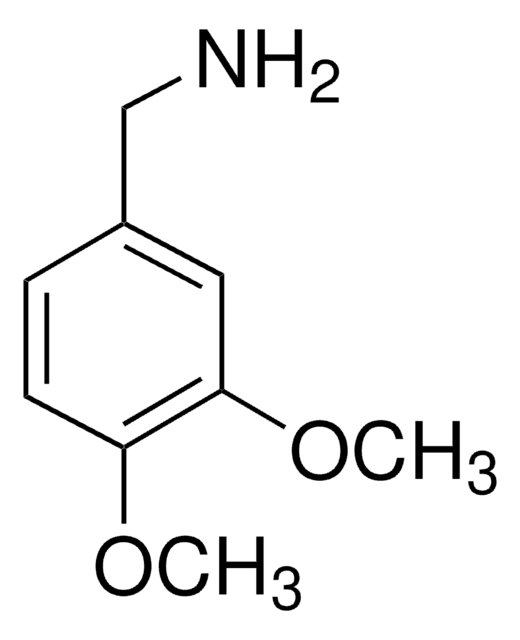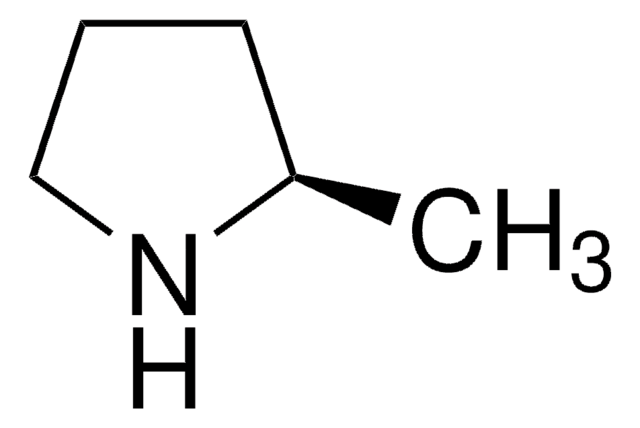H36605
4-Hydroxy-3-methoxybenzylamine hydrochloride
98%
Synonyme(s) :
Vanillylamine hydrochloride
Se connecterpour consulter vos tarifs contractuels et ceux de votre entreprise/organisme
About This Item
Formule linéaire :
HOC6H3(OCH3)CH2NH2 · HCl
Numéro CAS:
Poids moléculaire :
189.64
Numéro CE :
Numéro MDL:
Code UNSPSC :
12352100
ID de substance PubChem :
Nomenclature NACRES :
NA.22
Produits recommandés
Niveau de qualité
Pureté
98%
Pf
219-221 °C (dec.) (lit.)
Chaîne SMILES
Cl.COc1cc(CN)ccc1O
InChI
1S/C8H11NO2.ClH/c1-11-8-4-6(5-9)2-3-7(8)10;/h2-4,10H,5,9H2,1H3;1H
Clé InChI
PUDMGOSXPCMUJZ-UHFFFAOYSA-N
Mention d'avertissement
Warning
Mentions de danger
Conseils de prudence
Classification des risques
Eye Irrit. 2 - Skin Irrit. 2
Code de la classe de stockage
11 - Combustible Solids
Classe de danger pour l'eau (WGK)
WGK 3
Point d'éclair (°F)
Not applicable
Point d'éclair (°C)
Not applicable
Équipement de protection individuelle
dust mask type N95 (US), Eyeshields, Gloves
Faites votre choix parmi les versions les plus récentes :
Déjà en possession de ce produit ?
Retrouvez la documentation relative aux produits que vous avez récemment achetés dans la Bibliothèque de documents.
Les clients ont également consulté
Suvi F Flagan et al.
Environmental microbiology, 8(3), 560-565 (2006-02-16)
Capsaicin contributes to the organoleptic attributes of hot peppers. Here, we show that capsaicin is utilized as a growth nutrient by certain bacteria. Enrichment cultures utilizing capsaicin were successfully initiated using Capsicum-derived plant material or leaves of tomato (a related
Bellur Chayapathy Narasimha Prasad et al.
Journal of agricultural and food chemistry, 54(18), 6660-6666 (2006-08-31)
Capsaicin, a pungency factor alkaloid of Capsicum fruits, is biosynthesized by enzymatic condensation of vanillylamine, a phenyl propanoid intermediate, and 8-methyl-nonenoic acid, a fatty acid derivative from the leucine/valine pathway by capsaicin synthase. Biotic elicitors, such as aqueous mycelial extracts
Harishchandra B Gururaj et al.
Plant science : an international journal of experimental plant biology, 195, 96-105 (2012-08-28)
Capsaicinoid biosynthesis involves the participation of two substrates viz. vanillylamine and C(9)-C(11) fatty acid moieties. Vanillylamine which is a derivative of vanillin is synthesized through a transaminase reaction in the phenylpropanoid pathway of capsaicinoid synthesis. Here we report the functional
Yaqin Lang et al.
The Plant journal : for cell and molecular biology, 59(6), 953-961 (2009-05-29)
Capsaicinoids are responsible for the spicy flavor of pungent peppers (Capsicum). The cultivar CH-19 Sweet is a non-pungent pepper mutant derived from a pungent pepper strain, Capsicum annuum CH-19. CH-19 Sweet biosynthesizes capsaicinoid analogs, capsinoids. We determined the genetic and
Kenji Kobata et al.
Bioscience, biotechnology, and biochemistry, 75(8), 1611-1614 (2011-08-09)
Stable isotope-labeled precursors were synthesized for an analysis by liquid chromatography-tandem mass spectrometry (LC-MS/MS) to elucidate the biosynthetic flow of capsaicinoids, capsinoids, and capsiconinoids. [1'-(13)C][5-(2)H]-Vanillin was prepared by the condensation of guaiacol with [(13)C]-chloroform and a D(2)O treatment. Labeled vanillylamine
Notre équipe de scientifiques dispose d'une expérience dans tous les secteurs de la recherche, notamment en sciences de la vie, science des matériaux, synthèse chimique, chromatographie, analyse et dans de nombreux autres domaines..
Contacter notre Service technique














